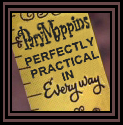Book Review: The Treasure Principle by Randy Alcorn
*I received this book for free from WaterBrook Multnomah Publishing Group for this review as a member of their Blogging For Books program.
Recently, I received my second book to read and review from the Blogging for Books program. I absolutely love to read, and there were many, many novels available on the site which were of great interest to me personally, but had nothing at all to do with the subject matter of my blog. For this reason, I try to be very selective when choosing books, knowing that I will eventually have to write a blog post about them, and I want the posts to be relevant and also helpful to all of you.
I really thought that I had chosen a great book to review on this site, and that I would have many great things to say about it and that it would encourage us all. I was very excited to begin reading it when it arrived. Unfortunately, I was also very disappointed while reading through this book.
It's not that the book itself was bad. I actually agreed with pretty much everything that was said in the book. I honestly think that if I reread this book at a different stage in my life (like perhaps retirement), that it might then be much more relevant and encouraging to me. I also noted that the book was first published in 2001, which was a very different economic time than what we are living in right now. As I read through this book, I tried to keep these things in mind.
The title of the book "The Treasure Principle" is taken from the Biblical concept of storing up treasures in Heaven instead of on Earth. Essentially, not amassing wealth in this life, since we cannot take it with us into the afterlife, and that what we sacrifice here on Earth will be multiplied and returned to us in Heaven.
The subtitle of this book is "Unlocking the Secret of Joyful Giving." I initially thought that it would talk about many aspects of giving and self-sacrifice, such as donating items and time, but all it really talked about was giving money, which is all fine and good. However, the verbiage used in the book was a bit of a put off for me. He spoke as if everyone who had picked up this book should be in great shape financially:
"Just as Esther was in a position of privilege, so is nearly everyone reading this book. Are you educated and literate? Do you have food, shelter, a car, perhaps some electronic equipment? Then you are among the privileged, the world's wealthy."
Wow! I had no idea anyone had this in mind as a definition of wealth! Perhaps this statement would have been more true 10 years ago when it was written? I also think that he was implying (without actually saying as much) that Americans are wealthy as a whole compared to some other nations.
He also made the statement several times that people should not wait to give because they never know when they will not have it to give anymore. Personally, I think the present economic state of things is just that time that he was concerned about.
"We have no way of knowing how long our nation's prosperity will last. Why not give away the abundance while we still can? Let's give until our hearts are more in touch with God's kingdom work than with our remodeling projects, business ventures, dream vacations, and retirement plans."
I've heard so many stories recently about people who have lost jobs, lost a spouse, lost their health, and had other major expenses pop up unexpectedly. The author said that these things will undoubtedly happen, but that we should not plan for them to happen. We should give away whatever we don't need at the moment, and trust God to provide for us later on. This goes against everything I learned from Dave Ramsey in my Financial Peace classes at church!
The author of this book and Dave Ramsey would agree on one thing, though. The way in which giving should be done: by budgeting!
"Why not set a figure you can live on, then tell God that everything He provides beyond that amount you'll give back to Him?"
He told stories of people who did this, and were able to give away up to 90% of their income. I think that would be incredible! If I were ever in that position (doubtful!), then I would love to be able to do just that. But what about us people who actually need more like 110% of our income to live on, but some how God still blesses us and let's everything work out each month?
I suppose my overall conclusion after reading this book is that it was not fitting for me for the stage of life that I am in right now, and perhaps it is not as fitting to the general populous of this country as it may have been 10 years ago when it was written. I do think that our country will see strong financial times again someday and that this book will again be more relevant.
I do not think that a poor economy should let of off the hook in our generosity, though. We can bless many others with our time and with our talents even if we have no money to share. I think that tough economic times can make people band together and "give" in more creative ways than they ever thought possible.
Have you been able to help someone by "giving" something other than money? Tell us about it!


























3 comments:
I was excited to see an old friend in Krogers a couple of weeks ago. She just had produce and a bottle of salad dressing in her cart. I had my binder and was able to whip out a coupon for her dressing... That was fun!!!
I agree with a lot of what you said in your review of the book, however I would like to add that we are to budget and live on 90%. The first 10 belongs to God and goes to support the local church.
PJ
That is awesome about the friend and the coupon!
I completely agree with you about the tithing, and that was another thing about this book that disappointed me is that he did not talk much about tithing or giving to your church home. He kind of treated that like a given, and said that was the minimum to be expected of us, and made it sound as if there would be no treasure waiting for us unless we went above and beyond that. Plus he also never mentioned anything about giving to help in our own communities (except to torment abortion clinics, which he has more than once been arrested for apparently), but only about giving to foreign missions, and that is fine, but its not the only need certainly.
I suppose I was more put off with the way he said things that the actual things he said.
Balance! I believe it is all about balance. We are to give out of our "abundance" but we also are taught to "store up." Couponers often do not have monetary abundance, but we do have a stockpile we can share--especially when a need arises.
It is true, we are RICH compared to like 90% of the people in the world. If you follow Samaritan's Purse's ministry at all you will easily see that--even just clean, running water is a luxury to some. But I am finding that it is more and more expensive to just live here--even like the recent television change (whatever that was) we can no longer get any channels without cable. So we bought cable for the first time and that is not a small expense. (We actually used birthday & Christmas gift money to get it and pay for the first year).
I think the bottom line for me is being open to what God directs us as individuals to do above the tithe based on the teachings in His Word. And you are right, different times in life are different. I also believe there are people with the gift of giving, and perhaps faith, that allows them to give to the extent he is talking about--and they should if that is their ministry. But when we try to push our spiritual gift onto others we very well may be pushing them into disobedience and keeping them from using their own gift.
My father's aunt was married to a "Christian" who gave all their money away all the time (in the 30's & 40's). She was pregnant with her 4th child and knew they could not care for it so she tried to abort it herself and in the process it took her own life. That is what his giving led to.
Okay, now that I have written my own book! LOL Great job on the review. I want to encourage you (as you sounded a bit discouraged in the review) to take it before the Lord and let Him direct you, put the book aside (or in the trash--ouch, I know, books are precious, but I don't think you want to pass it on either).
Post a Comment